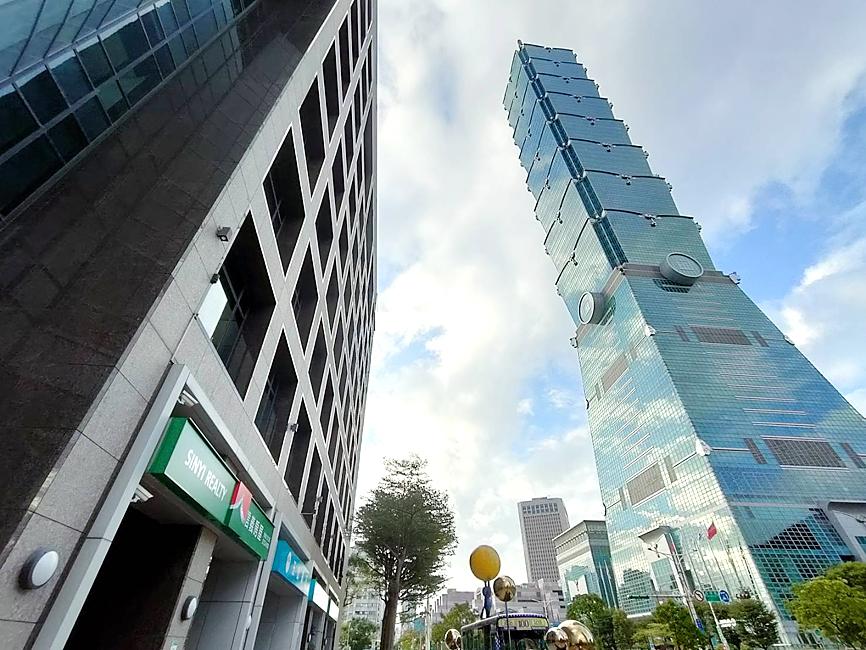The Taipei 101 skyscraper in the capital’s Xinyi District (信義) held on its title as the “King of the Land” nationwide for the ninth consecutive year, with the property valued at NT$6.3 million (US$226,782) per square meter, while buildings in other locations lost value due to the COVID-19 pandemic, the Taipei City Government said.
The changes in ranking and value came after the Taipei City Government adjusted assessed land value for taxation purposes next year. Homeowners have to pay land taxes annually and land value increment taxes upon selling their houses.
The Shin Kong Tower (新光摩天大樓) across the Taipei Railway Station in Zhongheng District (中正) ranked second at NT$6.08 million per square meter, but risks being overtaken by Bellavita Mall, Breeze Xinyi Mall (微風信義) and Cathay Landmark (國泰置地廣場) near Taipei 101 at NT$6.04 million per square meter, it said.

Photo: Hsu Yi-ping, Taipei Times
Land values in Taipei rose by an average of 3.41 percent, led by Nangang District (南港) with a 4.22 percent gain, attributable mainly to improving infrastructure, city officials said.
Neihu District (內湖) also fared strongly, with a 4.1 percent increase, thanks to the presence of major technology firms.
The city government said it would not extend reliefs on land taxes next year as businesses have largely resumed normal operations.
Shihlin District (士林) saw its land value rise 2.26 percent, as it remains affected by a lack of domestic and international tourists, officials said.
For similar reasons, major hotels in Taipei saw their land value decline. The value of Mandarin Oriental Taipei (文華東方酒店) dropped 5.94 percent, while Grand Hotel (圓山飯店) and the Regent Hotel Taipei lost 4.84 percent and 3.89 percent respectively, officials said.
Furthermore, land value in the Shihlin business district weakened 6 percent, while the Wanhua-Ximen (萬華西門) area and Daan District (大安) both slid 2 percent.
As for residential complexes, The Palace (帝寶) remained the most expensive for an 11th straight year at NT$4.65 million per ping (3.3m2), followed by a building in Xinyi District at NT$4.24 million, the city said.
Taipei homeowners will have to pay an extra NT$378 in land taxes next year based on the land value adjustments, officials said.
Property transfers in the city rose 12.36 percent to 30,799 this year, while prices climbed 2.92 percent from a year earlier, suggesting a stable improvement, officials said.

South Korea’s equity benchmark yesterday crossed a new milestone just a month after surpassing the once-unthinkable 5,000 mark as surging global memory demand powers the country’s biggest chipmakers. The KOSPI advanced as much as 2.6 percent to a record 6,123, with Samsung Electronics Co and SK Hynix Inc each gaining more than 2 percent. With the benchmark now up 45 percent this year, South Korea’s stock market capitalization has also moved past France’s, following last month’s overtaking of Germany’s. Long overlooked by foreign funds, despite being undervalued, South Korean stocks have now emerged as clear winners in the global market. The so-called “artificial intelligence

CONFUSION: Taiwan, Japan and other big exporters are cautiously monitoring the situation, while analysts said more Trump responses ate likely after his loss in court US trading partners in Asia started weighing fresh uncertainties yesterday after President Donald Trump vowed to impose a new tariff on imports, hours after the Supreme Court struck down many of the sweeping levies he used to launch a global trade war. The court’s ruling invalidated a number of tariffs that the Trump administration had imposed on Asian export powerhouses from China and South Korea to Japan and Taiwan, the world’s largest chip maker and a key player in tech supply chains. Within hours, Trump said he would impose a new 10 percent duty on US imports from all countries starting on

STRATEGIC ALLIANCE: The initiative is aimed at protecting semiconductor supply chain resilience to reduce dependence on China-dominated manufacturing hubs India yesterday joined a US-led initiative to strengthen technology cooperation among strategic allies in a move that underscores the nations’ warming ties after a brief strain over New Delhi’s unabated purchase of discounted Russian oil. The decision aligns India closely with Washington’s efforts to build secure supply chains for semiconductors, advanced manufacturing and critical technologies at a time when geopolitical competition with China is intensifying. It also signals a reset in relations following friction over energy trade and tariffs. Nations that have joined the Pax Silica framework include Japan, South Korea, the UK and Israel. “Pax Silica will be a group of nations

Chinese artificial intelligence (AI) start-up DeepSeek’s (深度求索) latest AI model, set to be released as soon as next week, was trained on Nvidia Corp’s most advanced AI chip, the Blackwell, a senior official of US President Donald Trump’s administration said on Monday, in what could represent a violation of US export controls. The US believes DeepSeek will remove the technical indicators that might reveal its use of American AI chips, the official said, adding that the Blackwells are likely clustered at its data center in Inner Mongolia, an autonomous region of China. The person declined to say how the US government received